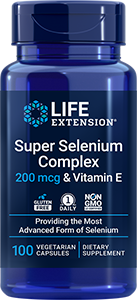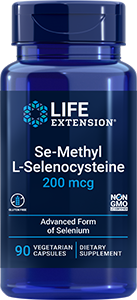
Selenium Supplement Benefits: Why This Antioxidant Mineral Matters
Published: November 2023 | Updated: November 2025
At a Glance
- Selenium is an essential mineral that supports thyroid, immune, heart, and brain health.
- Foods like Brazil nuts, meat (especially organ meat), eggs, poultry, cereals and legumes are good sources of selenium.
- Selenium supplements can be combined with vitamin E for optimal antioxidant support.
Vitamin and mineral supplements have long been a cornerstone of maintaining optimal health. Among these essential nutrients, selenium stands out as a small but mighty mineral with remarkable significance in our bodies.
Though required only in trace amounts, selenium plays an outsized role in protecting your cells and supporting key functions that keep you feeling your best. It plays a crucial role as an antioxidant, protecting our cells from oxidative stress. Selenium is also necessary for the synthesis and metabolism of thyroid hormones, and it supports immune system function, as well as heart and brain health.
Maintaining optimal selenium levels is important for healthy aging and can be achieved through the food we eat as well as selenium supplements. Let's explore the science-backed benefits of selenium and how to incorporate this nutrient into your daily routine.
What is selenium and why does your body need it?
Selenium is a constituent of 25 selenoproteins, which are important proteins for cell reproduction, DNA health and more. Your body uses selenium to support thyroid health, immune defense, heart and brain protection, and healthy aging.
This essential trace mineral is naturally present in many foods and is added to others. High-protein foods such as Brazil nuts, seafood, meat, and poultry are good sources of selenium. Dietary supplements that contain different forms of selenium can also help optimize your selenium levels.
7 key health benefits of selenium supplements
1. Healthy thyroid function
The thyroid is a small, butterfly-shaped gland located in the front of the neck. Though it is small, it has a big job: helping to regulate the body's metabolic processes.
Selenium plays a key role in thyroid function. In fact, the thyroid is the organ with the highest amount of selenium per gram of tissue.
Selenium helps an enzyme that is responsible for converting the thyroid hormone into its most active form. So maintaining healthy selenium levels can help maintain healthy thyroid hormone levels and healthy function of the thyroid.
2. Healthy aging
Levels of several health-promoting minerals, including selenium, have been shown to be high among some of the world's longest-living people, suggesting that selenium is an important mineral for healthy aging.
3. Immune health
Selenium plays a role in immune system function by encouraging the development, maturation and function of immune cells in healthy adults.
Selenium also helps protect immune cells from oxidative stress thanks to its antioxidant properties, which help to combat free radicals.
4. Antioxidant protection
Selenium is part of 25 selenoproteins that perform a range of important functions, most notably antioxidant defense.
One key example is glutathione peroxidase, a major antioxidant enzyme that depends on selenium for its activity. This antioxidant function serves as the foundation for many of selenium's health benefits.
5. Cardiovascular health
There is an impressive body of evidence to show the important functions of selenium and selenoproteins in the cardiovascular system. In a large U.S. study, higher blood selenium levels were associated with cardiovascular health and healthy aging.
6. Brain health
Because the brain is highly metabolically active and vulnerable to oxidative stress, researchers have explored selenium's role as an antioxidant in supporting brain health. Studies have found that selenium intake was associated with healthy cognitive function.
7. Healthy cell division
Selenium is a vital nutrient for healthy cell division, another reason it's key for whole-body health and worth ensuring you get enough.
What's the best source of selenium: food or supplements?
There are many good food sources of selenium, including plant-based, dairy-free, soy-free and yeast-free options. But selenium supplements can help fill the nutrient gap for those with low dietary intake, and they provide convenient dosing with multiple forms of selenium.
Selenium-containing foods include:
- Brazil nuts
- Seafood
- Meat (especially organ meat)
- Egg
- Poultry
- Whole-wheat cereals
- Grains like brown rice, oatmeal and selenium-enriched pasta
- Legumes
Selenium supplement forms include:
- L-Selenomethionine
- Sodium Selenite
- Se-Methyl L-Selenocysteine
These important forms of selenium are sometimes included in a supplement with vitamin E, a complementary antioxidant that also supports protection against oxidative stress in the body.
| Selenium foods | Selenium supplements | |
|---|---|---|
| Why choose it |
|
|
| Sources |
|
|
Explore Our Best Immune Support Supplements
How to take selenium supplements safely
Before starting any supplement regimen, you should talk with a healthcare professional, such as a doctor or registered dietitian. They can help determine your selenium levels and provide personalized guidance on your supplement needs.
When taking a selenium supplement, always follow the directions on the supplement label. Selenium supplements should be taken with food to support optimal absorption.
You can also consider pairing selenium with vitamin E for complementary antioxidant support. Selenium and vitamin E both promote protection from oxidative stress, and this promotes heart health, brain health and healthy cell division within the body.
While selenium is an essential trace element necessary for many bodily functions, including antioxidant protection against free radicals and immune system support, there are certain individuals who should exercise caution when taking selenium supplements. Additionally, those with adequate selenium intake may not benefit from a selenium supplement. For example, those who consume Brazil nuts regularly are likely to have sufficient selenium levels already.
Vitamins and supplements may be able to support your thyroid and adrenal health. Our health needs quiz can give a personalized recommendation on nutrients that fit your lifestyle and concerns.
What are selenium supplements good for?
Selenium supports whole-body health through several important roles. It is essential for thyroid function, helping to convert thyroid hormones to their active form to support metabolism.
It also promotes healthy aging, with studies linking higher selenium levels to longevity, and supports immune function.
As a key component of antioxidant enzymes like glutathione peroxidase, selenium helps defend against oxidative stress, benefiting heart, brain, and cell health for overall wellness.
Which is the best form of selenium?
There are three main forms of selenium commonly used in supplements, and each has been studied for different purposes: L-selenomethionine, sodium selenite and Se-methyl L-selenocysteine.
Each form offers unique benefits and getting a combination through a selenium complex can help ensure well-rounded support. Selenium can also be combined with vitamin E for complementary antioxidant support.
Key Takeaways
- Selenium is a powerful antioxidant mineral that supports thyroid function, healthy aging, immune defense, heart and brain protection, and healthy cell division.
- While selenium is present in foods like seafood, meat, and Brazil nuts, supplements may help those with low dietary intake.
- Pairing selenium with vitamin E may complement its antioxidant benefits.
References
- Chang CP, You CH. "Serum selenium and reduced mortality in middle-aged and older adults with prefrailty or frailty: the mediating role of inflammatory status." Front Nutr. July 2025. https://pubmed.ncbi.nlm.nih.gov/40791232/
- Fairweather-Tait SJ, et al. "Selenium status and immunity." Proc Nutr Soc. February 2023. https://pubmed.ncbi.nlm.nih.gov/35983607/
- Ferdous KA, et al. "Association between selenium intake and cognitive function among older adults in the US: National Health and Nutrition Examination Surveys 2011-2014." J Nutr Sci. May 2023. https://pubmed.ncbi.nlm.nih.gov/37180486/
- Filippini T, et al. "Diet composition and serum levels of selenium species: A cross-sectional study." Food Chem Toxicol. May 2018. https://pubmed.ncbi.nlm.nih.gov/29621579/
- Hou X, et al. "Selenium Compounds and Their Bioactivities: Molecular Mechanisms and Prospects for Functional Food and Therapeutic Applications." Plants (Basel). August 2025. https://pubmed.ncbi.nlm.nih.gov/40941787/
- Kim SJ, et al. "Antitumor Effects of Selenium." Int J Mol Sci. October 2021. https://pubmed.ncbi.nlm.nih.gov/34769276/
- Rotruck JT, et al. "Selenium: biochemical role as a component of glutathione peroxidase." Science. February 1973. https://pubmed.ncbi.nlm.nih.gov/4686466/
- Woo J, Lim W. "Anticancer Effect of Selenium." Ewha Medical Journal. January 2017. https://www.e-emj.org/journal/view.php?doi=10.12771/emj.2017.40.1.17
- "Selenium." Harvard School of Public Health. March 2023. https://nutritionsource.hsph.harvard.edu/selenium/
- "Selenium." National Institutes of Health. June 2025. https://ods.od.nih.gov/factsheets/Selenium-Consumer/
Always be in the know!
Access the latest deals, wellness news, expert health tips & more!











